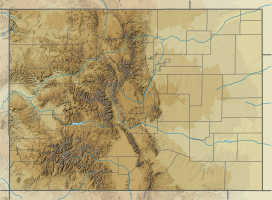
Summary
Powell Peak is a summit in Grand County, Colorado, in the United States.[3] With an elevation of 13,176 feet (4,016 m), Powell Peak is the 493rd-highest summit in the state of Colorado.[1]
| Powell Peak | |
|---|---|
 Powell Peak viewed from the Tundra Communities Trail, Rocky Mountain National Park | |
| Highest point | |
| Elevation | 4,015 m (13,173 ft) |
| Prominence | 212 m (696 ft) |
| Parent peak | McHenrys Peak (13,327 ft)[1] |
| Coordinates | 40°15′57″N 105°39′53″W / 40.2657707°N 105.6646741°W[2] |
| Naming | |
| Etymology | John Wesley Powell |
| Geography | |
 Location in Colorado  Powell Peak (the United States) | |
| Country | United States |
| State | Colorado |
| County | Grand County / Larimer County |
| Protected area | Rocky Mountain National Park |
| Parent range | Rocky Mountains Front Range |
| Topo map | USGS McHenrys Peak |
The peak was named for John Wesley Powell.[4] The mountain's toponym was officially adopted in 1961 by the United States Board on Geographic Names.[2]
Precipitation runoff from the mountain's east slope drains into Glacier Creek which is a tributary of the Big Thompson River, and the west slope drains to Grand Lake via North Inlet.
Climate edit
According to the Köppen climate classification system, the peak is located in an alpine subarctic climate zone with cold, snowy winters, and cool to warm summers.[5] Due to its altitude, it receives precipitation all year, as snow in winter, and as thunderstorms in summer, with a dry period in late spring.
See also edit
- List of peaks in Rocky Mountain National Park
- Thirteener
- Mountains portal
Further reading edit
- James Dziezynski, Best Summit Hikes in Colorado, P 140
References edit
- ^ a b "Powell Peak - 13,197' CO". listsofjohn.com. Retrieved April 24, 2023.
- ^ a b "Powell Peak". Geographic Names Information System. United States Geological Survey, United States Department of the Interior. Retrieved April 24, 2023.
- ^ U.S. Geological Survey Geographic Names Information System: Powell Peak
- ^ Dziezynski, James (1 August 2012). Best Summit Hikes in Colorado: An Opinionated Guide to 50+ Ascents of Classic and Little-Known Peaks from 8,144 to 14,433 Feet. Wilderness Press. p. 140. ISBN 978-0-89997-713-3.
- ^ Peel, M. C.; Finlayson, B. L.; McMahon, T. A. (2007). "Updated world map of the Köppen−Geiger climate classification". Hydrol. Earth Syst. Sci. 11. ISSN 1027-5606.


